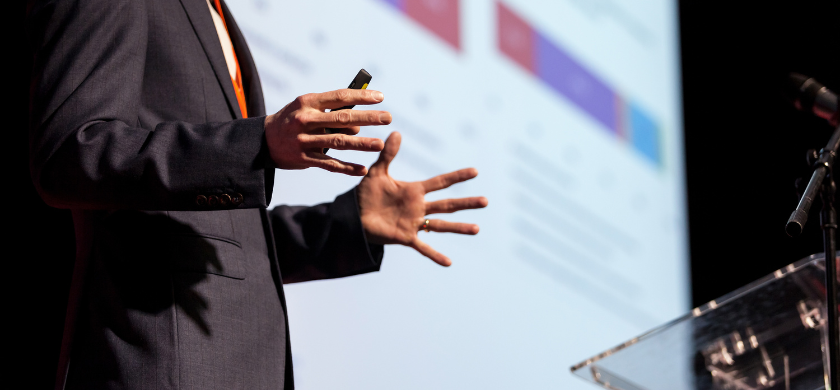Convention centers host dozens of conferences throughout a year, gathering thousands of attendees and hundreds of organizations. In turn, convention centers are ripe for bad actors looking to breach security — both in-person and online. To protect convention centers, venues need to install holistic security measures.
Read on to discover the importance of security within convention centers, alongside a few IoT-enabled solutions to ensure protection of attendees and employees alike.
The Importance of Convention Center Security
With high-density areas, sprawling floorplans, and thousands of professionals gathered at any given time, convention centers are at an incredible high-risk of criminal attacks. Convention center security is essential to protect the physical well-being and data privacy of both attendees and employees.
Convention Center In-Person Security
Public spaces have become increasingly more dangerous. In the United States, mass shootings public spaces have skyrocketed from 417 in 2019 to 647 in 2022 — a devastatingly high rise. In response to rising violence, public spaces need to up their security and ensure they catch assailants before they enter a space.
Convention centers are no exception. Packed and hard to navigate, security conflicts in convention centers can be difficult to resolve; not only can attendees struggle to make it to safety, but assailants can blend in amidst massive crowds. In order to both prevent and remedy conflict, convention centers need to install means of violence prevention using IoT technology.
IoT-connected security devices include online-connected surveillance cameras, facial recognition software, integrated sensors to detect gunshots or fire/smoke, and physical checkpoints using mobile check-in technology. All of these in-person security solutions require a responsive WiFi platform to function — such as the industry-leading networks installed by our team.
Convention Center Cybersecurity
The need for cybersecurity is on the rise. Over the last decade, cybercrime costs have skyrocketed from $3 trillion in 2015 to a projected $10.5 trillion in 2025. Consequences of cybercrime can cause catastrophic financial losses — without mentioning the massive breaches in privacy spurred from cyberattacks.
These concerns are further amplified at convention centers. Conferences gather important business professionals from across the country to meet & connect — all connected via convention center WiFi. A breach in convention center cybersecurity can simultaneously compromise the private information of hundreds of business professionals and their respective companies.
Hospitality Network offers WiFi networks for exhibitors and show management teams installed based on your specific needs, scaling our solutions to increase security per your budget and risk factors. Our team also offers dedicated internet connections — harder to hack or breach then typical networks.

Convention Center Security Technology Essentials
With both physical security and cybersecurity being of the utmost importance for convention centers, venues need to install the necessary means to protect their attendees from both kinds of threats. Integrated IoT technology offers a connected means to keep convention centers secure — here are a few technology-driven essentials to protect guests online & in-person.
Online-Connected Surveillance Cameras
Surveillance cameras are key to detecting the location of event attendees and potential bad actors in real-time, from any device. Using online software, surveillance cameras can stream video to laptops, mobile phones, tablets, and any other IoT-integrated devices. Accordingly, security can immediately access footage from areas suspected of dangerous activity.
Checkpoints with Mobile Check-In
Every event at a convention center features hundreds (if not thousands) of attendees moving in and out of a venue. Keeping track of attendees can be incredibly difficult without IoT integration — making security risks far harder to track.
Checkpoints featuring mobile check-in can help keep track of who enters a convention center, when. By leveraging multiple Internet-connected check-in devices scanning mobile tickets, convention centers can track who is in every part of their venue in real-time. If conflict breaks out, security can then pinpoint who is in each area — alerting necessary personnel & attendees and more efficiently tracking the source of duress.
Securing WiFi Networks with Passwords & Verified Captive Portals
Due to the nature of conferences, convention centers are often located in highly populated areas, regardless of event attendance. In turn, convention centers tend to be surrounded by non-attendees — who, if unsecured, will most definitely attempt to access high-speed convention center WiFi. Even worse, non-attendees may attempt to hack into your network to steal user-data.
Securing convention center networks with passwords & captive portals prevents these non-attendees from accessing your WiFi. Passwords offer the simplest way to protect a network; simply make the network password protected and only email attendees the access code. Convention centers can also change the password from day-to-day to keep networks more secure.
Captive portals offer an even greater layer of security for network access. These landing pages present a terms & conditions page before prompting users to sign-in using an email address — further tracking who is using a network and which emails logged on when in case of a data breach or bad actor.
Restricted Access to Dangerous Websites
Many breaches of cybersecurity occur due to malware installed from dangerous third-party websites. Conference attendees may accidentally visit dangerous websites through:
- Scam emails mimicking trusted sources or security alerts.
- Shortened links masquerading as links to more reliable websites.
- PDF or video downloads from third party sources.
- Fraudulent pop-up ads making it unclear where to click without opening.
To prevent data-breaches through these websites, convention centers can restrict access to dangerous sites by blocking them via their network access. Using DNS (Domain Name System) filtering, convention centers can block virus-infected websites, phishing sites, and certain viruses altogether. Convention centers can use a broader DNS service and let a separate, specialized team to constantly update their list and block new harmful sites.

Hospitality Network Supports Smart Convention Center Technology
Smart convention centers leverage all of the above essentials (and more) to keep their attendees safe from security threats. As threats evolve, so too does the need for IoT-enabled convention center security. In order for these solutions to work as intended, however, convention centers need responsive, reliable internet connectivity.
Hospitality Network supports WiFi networks across diverse convention centers — paving the way for solutions including convention center IoT security solutions. Looking to improve security in your venue? Request a consultation with our expert team today.

